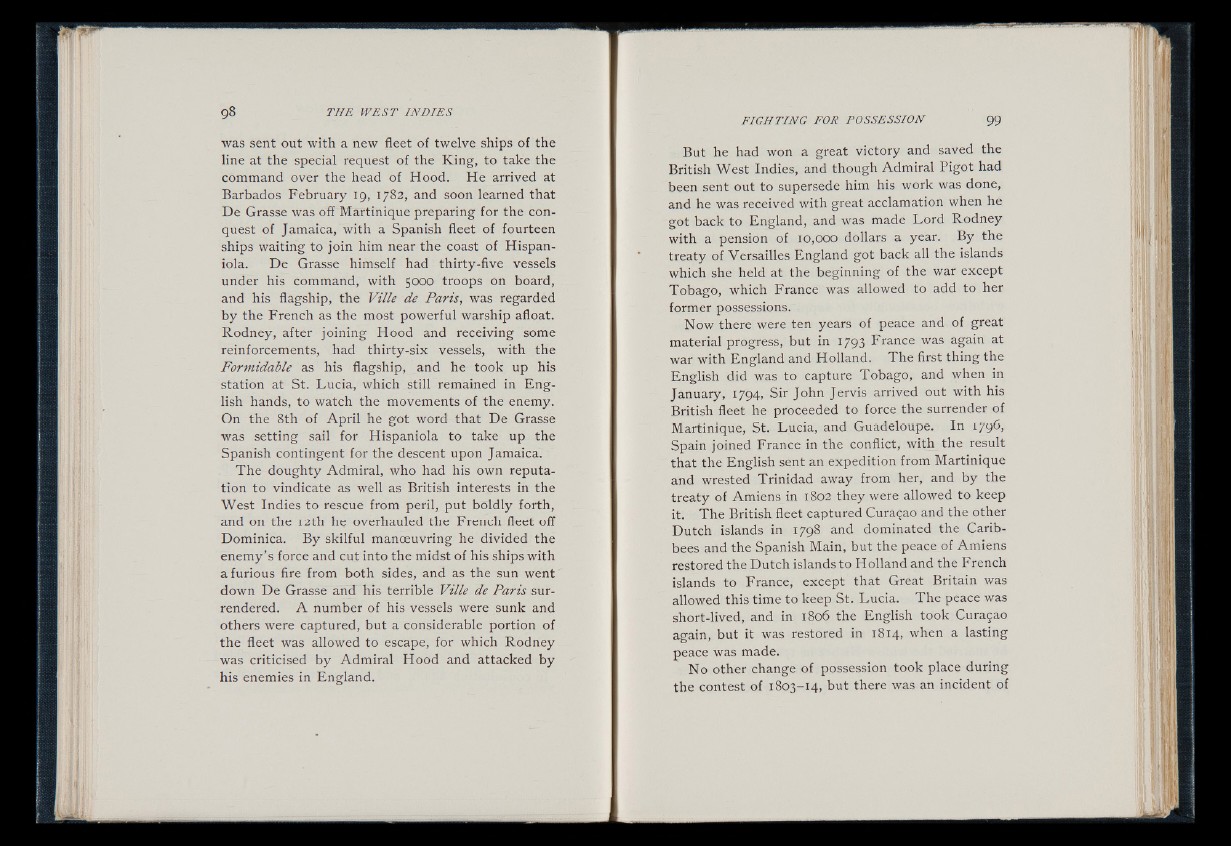
was sent out with a new fleet of twelve ships of the
line at the special request of the King, to take the
command over the head of Hood. He arrived at
Barbados February 19, 1782, and soon learned that
De Grasse was off Martinique preparing for the conquest
of Jamaica, with a Spanish fleet of fourteen
ships waiting to join him near the coast of Hispaniola.
De Grasse himself had thirty-five vessels
under his command, with 5000 troops on board,
and his flagship, the Ville de Paris, was regarded
by the French as the most powerful warship afloat.
Rodney, after joining Hood and receiving some
reinforcements, had thirty-six vessels, with the
Formidable as his flagship, and he took up his
station at St. Lucia, which still remained in En g lish
hands, to watch the movements of the enemy.
On the 8th of Ap ril he got word that De Grasse
was setting sail for Hispaniola to take up the
Spanish contingent for the descent upon Jamaica.
T h e doughty Admiral, who had his own reputation
to vindicate as well as British interests in the
West Indies to rescue from peril, put boldly forth,
and on the 12th he overhauled the French fleet off
Dominica. B y skilful manoeuvring he divided the
enemy’s force and cut into the midst of his ships with
a furious fire from both sides, and as the sun went
down De Grasse and his terrible Ville de Paris surrendered.
A number of his vessels were sunk and
others were captured, but a considerable portion of
the fleet was allowed to escape, for which Rodney
was criticised by Admiral Hood and attacked by
his enemies in England.
But he had won a great victory and saved the
British West Indies, and though Admiral Pigot had
been sent out to supersede him his work was done,
and he was received with great acclamation when he
got back to England, and was made Lord Rodney
with a pension of 10,000 dollars a year. B y the
treaty of Versailles England got back all the islands
which she held at the beginning of the war except
Tobago, which France was allowed to add to her
former possessions.
Now there were ten years of peace and of great
material progress, but in 1793 France was again at
war with England and Holland. The first thing the
English did was to capture Tobago, and when in
January, 1794, Sir John Jervis arrived out with his
British fleet he proceeded to force the surrender of
Martinique, St. Lucia, and Guadeloupe. In I 79^>
Spain joined France in the conflict, with the result
that the English sent an expedition from Martinique
and wrested Trinidad away from her, and by the
treaty of Amiens in 1802 they were allowed to keep
it. T he British fleet captured Curasao and the other
Dutch islands in 1798 and dominated the Carib-
bees and the Spanish Main, but the peace of Amiens
restored the Dutch islands to Holland and the French
islands to France, except that Great Britain was
allowed this time to keep St. Lucia. T he peace was
short-lived, and in 1806 the English took Curagao
again, but it was restored in 1814, when a lasting
peace was made.
No other change of possession took place during
the contest of 1803-14, but there was an incident of